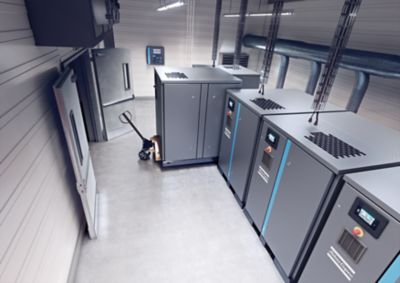Check out our compressed air system health check and audit options
Do you know the cost of compressed air in your plant? Do you have the right amount of compressed air? Could you reduce cost? Do you have compressed air leaks? We can help you find out!
Atlas Copco Compressors offers 3 levels of health check and energy audit for your compressed air installation, with the aim to assess whether there are opportunities for performance or efficiency improvements, better compliance and money / CO2 savings.
Level 1: Get a free visual inspection and energy potential calculation (EPC)
Whilst our energy calculator gives you a rough estimate of how much energy you could save, our FREE EPC can give you a more accurate estimation of your potential savings. The report will also be explained in detail by one of our sales engineers and you will have plenty of opportunities to ask questions!
So what's an EPC? The EPC focuses on the power usage of the compressors,
load v. unload hours, and average leak assessment, which results in a potential calculation, identifies if stage 2 is recommended, and will highlight real, tangible savings.
What is an #airCHECK free visual assessment?
The #airCHECK will cover general information such as compressor room environment, whether there are any air quality issues, and a visual inspection of all compressed air equipment on site, including appropriate capacity, ISO compliance, unproductive running, pressure, drain functionality and general equipment condition.
A written summary of the equipment health will be provided, outlining running equipment improvements, wasteful practices or non-conformance with ISO standards, along with an estimate of potential cost and energy savings.
Level 2: Energy assessment and recommendations through data logging (iiTrax)
Upon his or her visit, our engineer may recommend to opt for the next level of audit, based on your EPC or/and airCHECK report.
So how is this different from an EPC or an airCHECK? Where the EPC shows a potential for energy savings, the iiTrax is about fitting current logging equipment to each compressor which will record then map the energy consumed over a full week period, showing the actual running hours and calculated air usage. Based on this data we are able to calculate a realistic energy savings potential, make simulations and provide recommendations to achieve optimal energy efficiency. This service is free of charge!
To give you an example: We performed a compressed air flow audit at a cement producer during one week in Q1 2020. The resultant simulations revealed a potential saving of approx. £23,500 per annum (11% of annual energy costs) through upgrading to VSD+ compressors and a reduction in CO2 emissions of 140 tons/annum.
An example of an iiTrax profile flow
Level 3: Full AIRscan audit to ISO 11011 standard
If required, a full AIRScan will be quoted. This service
covers a range of parameters, such as flow testing, air
leak detection, air quality testing, measurement and
analysis of pressure and dew point throughout your
whole system, from compressor room to production
processes. Included in AirScan is reporting and
discussions of the most suitable methods to reduce
your energy costs and CO2 emissions. Note that this
audit almost always pays for itself in savings.
AIRScan follows the ISO 11011 standard for
compressed air energy efficiency assessments. This
ensures that your installation is assessed based on a
clearly defined framework. The AIRScan can also serve
as a benchmark for ISO 50001.
If you're not ready to book an energy audit yet, why not start by estimating your potential running cost savings with our estimator tool?

10 August, 2020
When Fabricon Design Ltd undertook a week-long iiTrak study of its compressed air usage, the calculations indicated annual energy savings in the region of 51% and a 5-year payback from an upgrade plan recommending a new compressed air system.
Read more
Check out our compressed air system health check and audit options




